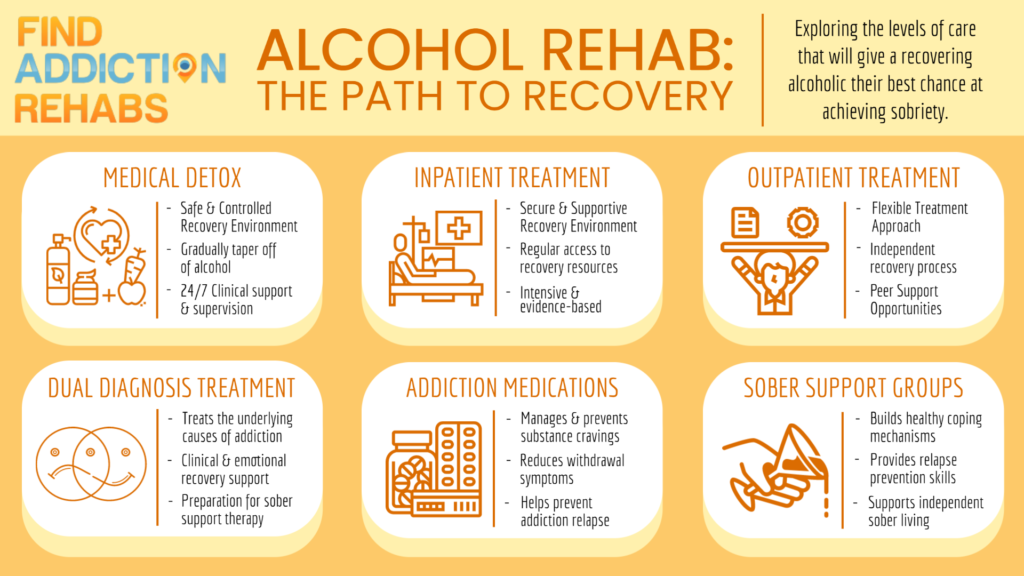What is Alcohol Rehab?
Table of Contents
- What is Alcohol Rehab?
- What is Alcohol? Is It A Drug?
- Understanding Alcohol Addiction
- What are the Signs of Alcohol Addiction?
- What are the Types of Alcohol Abuse?
- Alcohol Abuse Can Lead to Addiction
- What are the Side Effects of Alcohol Abuse?
- What Does the Alcohol Rehab Process Look Like?
- Mental Illness and Alcoholism
- The Importance of Dual Diagnosis Treatment for Alcohol Rehab
- Why is Medical Detox Necessary for Alcohol Treatment?
- Inpatient Alcohol Rehab Programs
- Outpatient Alcohol Rehab Programs
- Find the Right Alcohol Rehab For Your Needs Here
- Medically Reviewed By
When it comes to the concept of alcohol rehab, the terms alcohol use disorder and alcoholism are often used interchangeably. But these terms do not refer to the same things. Even ‘alcohol rehab’ can mean different things, depending on the level of treatment a person may need.
Someone with an alcohol use disorder has developed a moderate dependency on this substance as a result of abusing this substance, whereas alcoholism is used to refer to individuals whose addiction is more severe in nature.
Of course, you do not have to be an alcoholic to experience the negative effects of this substance use. But when it comes to alcohol abuse, anyone struggling with these issues is strongly encouraged to seek out professional alcohol rehab services.
What is Alcohol? Is It A Drug?
Alcohol is the prime and active ingredient in drinks like beer, wine, and spirits. Also known as ethyl alcohol, this substance is made through a fermentation process that combines yeast, and sugar from grains, fruits, and vegetables.
The production of alcohol goes back thousands of years, as evidence of alcohol was once discovered in a beer jug that dated back to 10,000 B.C. Researchers even located ancient Egyptian hieroglyphics from 4,000 B.C. that told stories of the pleasures of drinking and camaraderie. During these times, drinking was viewed as a leisure activity, and while that still remains true today, alcohol consumption has, unfortunately, taken a grim turn.
Now, alcohol has been labeled a drug and classified as a depressant due to the effect it has on the central nervous system (CNS). When consumed largely, alcohol slows down one’s brain and bodily functions. While alcohol is classified as a depressant, its consumption affects everyone differently. For example, some people consume alcohol for its stimulant effect, which occurs after the first few drinks. This provides individuals with an energy boost that makes them feel loose and lively. However, after too many drinks, the depressant effects settle in, and individuals start feeling groggy, dizzy, and no longer in control.
Understanding Alcohol Addiction
Alcohol addiction is considered a chronic disease because of the way that alcohol abuse changes your brain. When you drink alcohol, the brain releases a chemical called dopamine, which produces feelings of euphoria and relaxation.
Alcohol makes your brain release dopamine faster and in larger quantities than usual. The more you drink, the more dopamine your brain releases. Because of this, continuing to use alcohol in excessive quantities can make the brain unable to produce this chemical without it.
Many individuals who have developed this particular substance use disorder will notice that they no longer enjoy doing things that once made them feel happy without drinking. This, in turn, may lead them to continue abusing alcohol.
What are the Signs of Alcohol Addiction?
Alcohol addiction can be hard to recognize. Some people are particularly good at hiding their addiction, while others may be reluctant to admit that they have a problem. However, there are several signs you can look out for when attempting to detect an alcohol addiction.
According to the Diagnostic and Statistical Manual of Mental Disorders (DSM-5), these include:
- Drinking more or for longer periods of time than originally intended.
- Repeatedly unsuccessful attempts to quit drinking, even if there is a genuine desire to do so.
- Spending excessive amounts of time drinking or recovering from hangovers.
- Being unable to focus on or participate in other activities without the involvement of alcohol.
- Experiencing issues within work, school, or personal relationships due to drinking habits.
- No longer participating in previously enjoyable activities and hobbies due to drinking.
- Participating in potentially dangerous activities while under the influence, such as driving, having sex, or other actions.
- Continuing to drink despite this causing or worsening physical or mental health issues.
- Experiencing withdrawal symptoms when not under the influence, or drinking more frequently to avoid these symptoms.
- Having to drink more frequently or in greater amounts in order to achieve the desired effects of alcohol use.
What are the Types of Alcohol Abuse?
It is important that anyone is capable of developing an alcohol dependence, regardless of their personal background or situation. With that being said, there are some individuals who may be more at risk of developing habits of alcohol or drug abuse.
People that are addicted to alcohol are typically divided into five distinct groups, including:
- Young adult subtype
- Young antisocial subtype
- Functional subtype
- Intermediate familial type
- Chronic severe subtype
Young adult subtype
This subtype begins showing impulsive behaviors when they are around 20 years old. They typically do not drink every day. Rather, they may participate in binge drinking two or more times per week.
For many people, this behavior will begin in college, typically within social situations. According to the National Institute on Alcohol Abuse and Alcoholism (NIAAA), this is the most common type of alcohol abuser in the United States today.
This subtype begins drinking at a young age, usually at around 15 years old. This early starting age can be attributed to these individuals having an antisocial personality disorder, which can make them impulsive and uncaring about the physical dangers of alcohol.
Someone who fits into this category will benefit from an integrated treatment approach to their recovery from addiction. These will incorporate dual diagnosis treatment options, as a means of addressing their co-occurring substance use and mental health disorders.
Functional subtype
The functional subtype is usually educated with higher income levels. These individuals tend to have more stable personal relationships than other types of alcoholics, and are typically binge drinkers who consume alcohol at least every other day.
Most functional subtypes begin drinking to cope with the stress of their demanding jobs. This may progress into feeling dependent upon alcohol to be able to relax or experience pleasure, particularly in social situations.
Intermediate familial subtype
This subtype typically consists of individuals who have at least one close family member who has either previously had or is currently struggling with a drinking issue. Intermediate familial subtypes usually begin drinking when they are about 17 years old.
These drinking habits typically begin as a method of coping with family stress that arises from their family member’s alcohol addiction. Unfortunately, this behavior generally leads to their own development of substance abuse habits.
Chronic severe subtype
This subtype has the most severe symptoms and issues associated with alcohol use. Most chronic severe alcoholics are men, and are typically associated with high rates of divorce because of this abuse.
These individuals also have a higher risk of abusing other drugs, most commonly cocaine or marijuana, along with that of alcohol. This combined drug and alcohol use can lead to a number of serious health issues, often requiring extensive alcohol rehab services to address.
Alcohol Abuse Can Lead to Addiction
The wide availability of alcohol makes it an easy and affordable drug of choice for many. And unlike other drugs, you don’t need a prescription for it, and you don’t have to be stealthy in purchasing it. Bystanders don’t think twice when they see someone purchase alcoholic beverages. Therefore, those who are struggling with this addiction can easily fly under the radar.
Unfortunately, alcohol addiction in America is far more prevalent than many think. In fact, there are approximately 17.6 million people who suffer from alcohol use disorders or chronic alcohol abuse throughout the United States — according to the National Council on Alcoholism and Drug Dependence (NCADD). As the stressors of modern-day life continue, this number only increases with each passing year.
What are the Side Effects of Alcohol Abuse?
There are several unpleasant side effects that can occur as a result of someone’s alcohol abuse. These include both short-term and long-term effects, both cases of which can become quite dangerous if not properly addressed.
Short-Term Effects
When drinking excessive amounts of alcohol in a short period of time, individuals may experience a number of unpleasant side effects which can detract from the more pleasurable feelings this behavior produces. These may include:
- Mood swings
- Lowered inhibitions
- Impulsive behaviors
- Slowed or slurred speech
- Nausea and vomiting
- Diarrhea
- Head pain
- Auditory, visual, and perceptual distortions
- Loss of coordination
- Trouble focusing or making decisions
- Loss of consciousness
- Gaps in memory (often called a blackout)
These effects may develop after even just one drink, depending on a person’s tolerance levels and metabolism rates.
Those resulting from dehydration, such as nausea, headache, and dizziness, can take several hours to appear, and may vary in their severity depending on whether an individual has been drinking other fluids with their alcohol.
Furthermore, cognitively and physically impairing side effects can make individuals more prone to injury, or lead them to making poor decisions, such as driving while under the influence – a behavior that can be life-threatening both to the individual and the people around them.
Long-Term Effects
For those who have been abusing alcohol for long periods of time, the side effects of this behavior are typically more damaging than those associated with short-term use. These may include:
- Increased anxiety and irritability
- Insomnia
- Weakened immune system
- Changes in sexual libido
- Changes in appetite and weight
- Decreased cognitive functions, such as poor memory
- Reduced ability to focus or concentrate
- Liver and kidney damage
Excessive drinking that continues over long periods of time can also lead to permanent brain damage. Some individuals may develop Wernicke-Korsakoff syndrome, or “wet brain,” a severe brain condition associated with memory loss and decreased cognitive functions.
What Does the Alcohol Rehab Process Look Like?
Alcohol treatment is often far more extensive and intensive than many people may initially assume. This is because alcohol can be an extremely dangerous substance to withdraw from, particularly for those who have formed a severe dependence on this substance.
Some of the most common substance abuse treatment options used to treat an alcohol addiction are detoxification, counseling, behavioral therapy, medication-assisted treatment, and mutual support groups.
Ultimately, there is no one-method-fits-all treatment for alcohol addiction. What works for one person may not work for another, so it is important to find a facility that offers a range of treatment options so that your individual needs can be met in the most effective way.
It may be helpful to seek professional treatment advice from your medical provider or an addiction specialist when attempting to narrow down what options will work best for your recovery from addiction.
Mental Illness and Alcoholism
As mentioned earlier, alcohol abuse can cause significant damage to the brain and cause a variety of mental health disorders. If an individual is already struggling with mental health issues before their downfall to alcoholism, their symptoms will worsen, and their alcohol abuse will progress.
More often than not, individuals who struggle with a mental health disorder are more like to develop problems of substance abuse and vice versa. This is especially true if help is not sought out for either one of these illnesses.
The Importance of Dual Diagnosis Treatment for Alcohol Rehab
The biggest reason to not try quitting alcohol on your own is that this does not address the core issues of your drinking problem. You will not receive the specialized care needed to help you learn why you have a drinking problem or the necessary tools to help you stay sober.
According to the Substance Abuse and Mental Health Services Administration (SAMSHA), it is quite common for individuals with mental illness to attempt to self-medicate their negative thoughts and emotions through substance use.
However, this solution is rarely ever effective, and can even result in the development of new or worsening of previously existing mental disorders. Because of this, many alcohol rehab programs will typically incorporate mental health services as a part of their treatment approach.
These may include specialized therapeutic treatment services, such as cognitive-behavioral therapy and motivational enhancement therapy, as well as individual, family, and group therapy sessions.
Why is Medical Detox Necessary for Alcohol Treatment?
Alcohol detox can be a long and unpleasant experience, especially for those struggling with a severe addiction to this substance. This is because their body has formed a dependency on alcohol in order to function.
If someone chooses to suddenly stop drinking alcohol, this can result in the development of severe withdrawal symptoms; some of which can be fatal without proper management. Because of this, individuals are encouraged to gradually taper off of alcohol, rather than quit “cold turkey.”
Whether withdrawing at a detox-specific treatment center, or through inpatient rehab centers that offer this service as a part of their approach to addiction recovery, these programs can provide the supervision and structure needed to safely withdraw from alcohol.
While participating in a detox program, individuals will be carefully weaned off their alcohol use with extensive clinical monitoring and support. They may also be given alcohol treatment medications to manage and prevent withdrawal symptoms, as well as reduce alcohol cravings.
These programs can not only give individuals their greatest chance at a safe and successful recovery from addiction but can also significantly reduce their risk of relapse.
Alcohol Withdrawal Symptoms
Symptoms of alcohol withdrawal can begin within as little as six hours after a person’s last drink. These can be extremely uncomfortable and are often one of the main reasons why people relapse when attempting to overcome addiction on their own. These may include:
- Anxiety
- Shaky hands
- Headache
- Nausea
- Vomiting
- Insomnia
- Sweating
More severe symptoms may include hallucinations, seizures, and stroke, which can be life-threatening without immediate support. At a medically supervised alcohol rehab facility, you can receive immediate medical assistance in the event of an emergency.
Inpatient Alcohol Rehab Programs
When participating in an inpatient or residential treatment programs, individuals will be required to live at a rehab center throughout the duration of their recovery process. These alcohol rehab centers, like detox treatment programs, provide constant access to recovery tools and support.
Furthermore, living full-time at inpatient treatment centers can help individuals overcome their addiction in an environment that removes them from outside distractions or temptations, significantly decreasing their risk of relapse.
Alcohol rehabilitation through an inpatient rehab program will typically incorporate several different approaches to addiction recovery in order to further promote healing in their clients, and help them to better maintain abstinence from substance use.
This may include mental health treatment options, such as individual counseling services, as well as group therapy or family therapy sessions. This level of inpatient treatment addresses both the addiction itself, as well as the underlying causes of a person’s habitual substance use.
Outpatient Alcohol Rehab Programs
Outpatient treatment providers offer a more flexible and independent approach to those overcoming an addiction to alcohol. These treatment programs will typically involve participation in relapse prevention and peer support groups, such as Alcoholics Anonymous (AA).
Recovering at an outpatient treatment facility may be a better option for those who are attempting to overcome a substance use disorder with unavoidable time or financial constraints. Additionally, joining AA is free, and becoming a ‘friend of Bill W‘ will open up many doors in terms of others who cherish and maintain their sobriety and can help you as well.
This level of alcohol rehab also commonly offers treatment options for those struggling with co-occurring disorders. These individuals can also significantly benefit from the peer support and independent sobriety resources these programs can provide.
Find the Right Alcohol Rehab For Your Needs Here
If you believe that you or a loved one is struggling with alcohol addiction, this can be an incredibly painful and difficult situation to deal with. However, you are not alone, and help IS available.
At Find Addiction Rehabs, our hotline is available 24/7 to connect you with an addiction treatment provider and alcohol rehab program that is dedicated to serving all of your personal care needs. We are here to help you, whatever time of day (or night) you may need it.
So don’t wait; call today, and let us help you get started on your recovery journey, where you can achieve a happier, healthier, and successfully sober you!
Eric R. hails from Maine and does extensive work in the field of behavioral health as both a professional writer and passionate advocate for those suffering. From his own personal encounters with mental illness, he speaks to those seeking healthy relief from depression and anxiety and embraces wellness both personally and professionally. After losing friends and family to the darkness of suicide, Eric aims to educate and inform about the nature of treatment and render it accessible for all those seeking a way out of darkness and despair.








